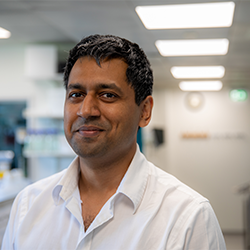
Submitted by Catherine Atkins on Wed, 01/02/2023 - 16:29
Congratulations to Dr Harveer Dev and a team from the University of Cambridge and the Knight Cancer Institute at OHSU who have been awarded a $1 million Challenge grant by the Prostate Cancer Foundation for their project entitled First-In-Man PARP1-selective inhibitor in lethal prostate cancer: mechanisms of action and biomarkers of therapeutic response. PCF Challenge Awards fund international, multi-institutional, cross-disciplinary teams of investigators conducting highly innovative research with the greatest potential for accelerating new and improved treatments for advanced prostate cancer. Following a rigorous peer review process that assessed each project’s scientific merit and potential patient impact, 15 highly coveted PCF Challenge Awards, totalling more than $12 million, were granted to teams at some of the world’s leading cancer research institutions.
Currently, men with metastatic prostate cancer have few treatment options, with most therapies carrying significant side effects. It is therefore important to select the most effective therapy to a specific patient's disease, which is the principle of delivering personalised medicine.
During 2022, two ground-breaking phase 3 clinical trials demonstrated that a drug targeting the DNA repair machinery (PARP inhibitor), when combined with standard of care anti-androgen therapy, exhibited a benefit across more men than was expected. The purpose of this project is to better understand how a new generation of PARP1 selective inhibitor (AZD5305) mediates its effect in prostate cancer. The team will ultimately use these insights to support moving this treatment to earlier stages of disease.
Harveer explains, “The trials found that the biomarkers we are using to determine who should get this treatment are incomplete. This Challenge Award will enable us to look to establish better predictive signals, from tumour tissue, and potentially from blood, that informs us whether a patient will benefit from this treatment or not.
We will also be studying the response of patients to the latest second-generation PARP inhibitors which promise even better tolerability, and lower toxicity. Ultimately this will mean that more men who are suitable could stand to benefit, while those who would not respond could be spared unnecessary treatment with ineffective therapies”
